Sowing seeds, excessive summer rains and the succulent garden
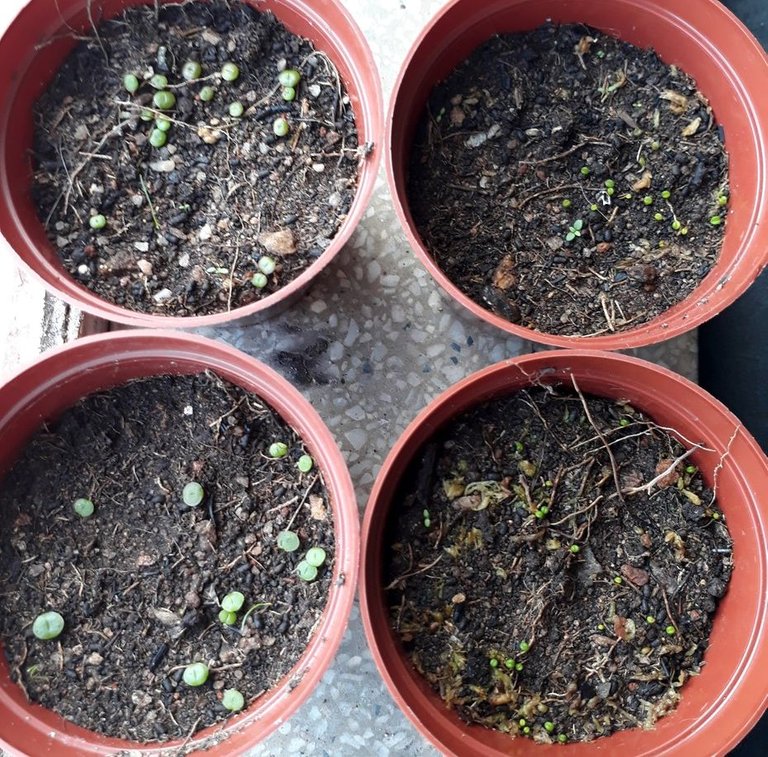
The larger sprouted seeds on the left are lithops and little ones the right are Frithia pulchra, which has purple flowers and Frithia humilis, which has white flowers.
I got Lithops and Frithia pulchra and humilis seeds last year but didn't get around to sowing them I wasn't sure if they were viable but I got a 50% germination rate which is not bad. I'm a bit of a heretic when it comes to sowing seeds because I don't believe in covering seeds or spraying tons of fungicide everywhere. I didn't even sterilise the seedling medium either. It's my experience that seeds sown in their correct season will grow adequately if they are misted with a spray-bottle every day but left exposed to air and ventilation do not easily get fungus and they develop with tougher, more fungus resistant skins. I sowed them in soil from the mountain which will have the correct ph balance for their growth. I find that plants grown outside in the summer rain often have little babies of all kinds that come up in the pots and these can be successfully raised.
Here's a young medusoid euphorbia that sprouted in the Haworthia pot
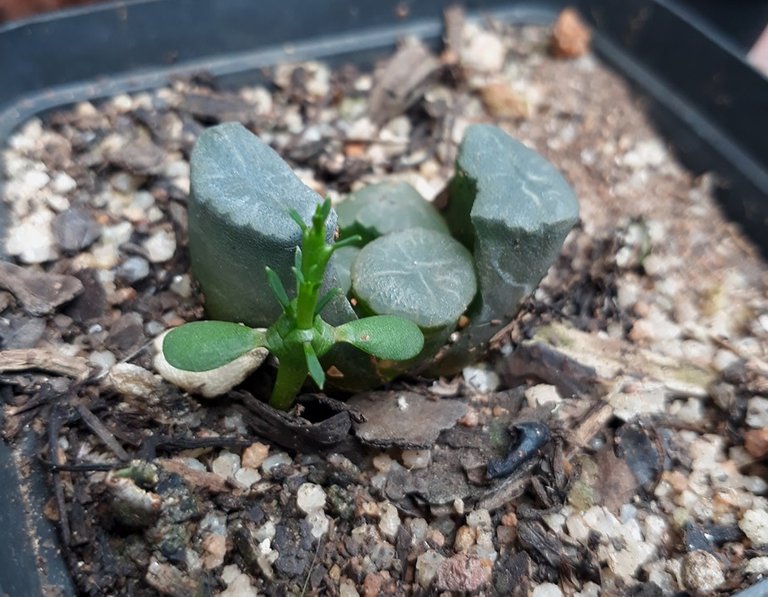
I found these tiny lithops in a pot today. They will join the others on the windowsill
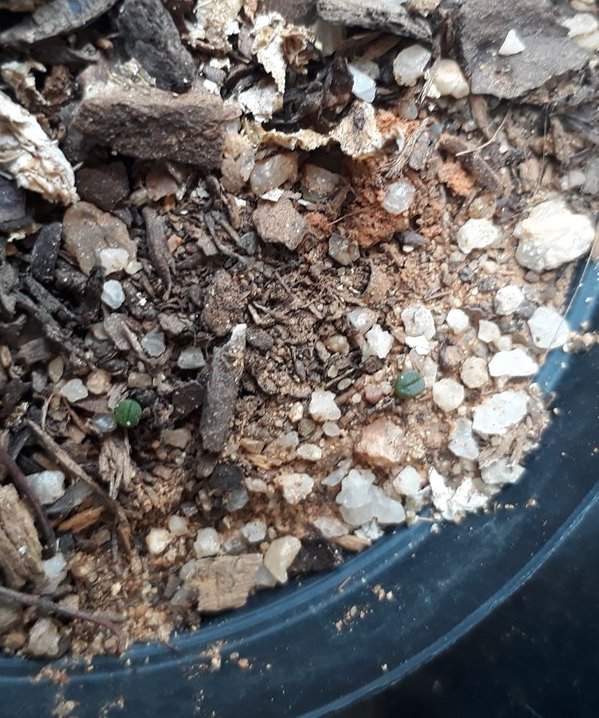
Many of the succulents I grow are native to my country and so they can be grown outdoors. The last 3 years have been difficult because La Nina activity has brought cooler weather and large amounts of rain so I have had to be careful and move many plants under cover to prevent rot. In general, It isn't wise to water succulents much when night temperatures exceed 22C, bacteria and fungi in the soil are active and cause rotting. They can tolerate a lot of rain though, because night temperatures are cool when it rains.
I wasn't fast enough with some of the plants and they either rotted or reacted badly to the strong sunlight after weeks of cloudy conditions. So I got this:

And this 😟
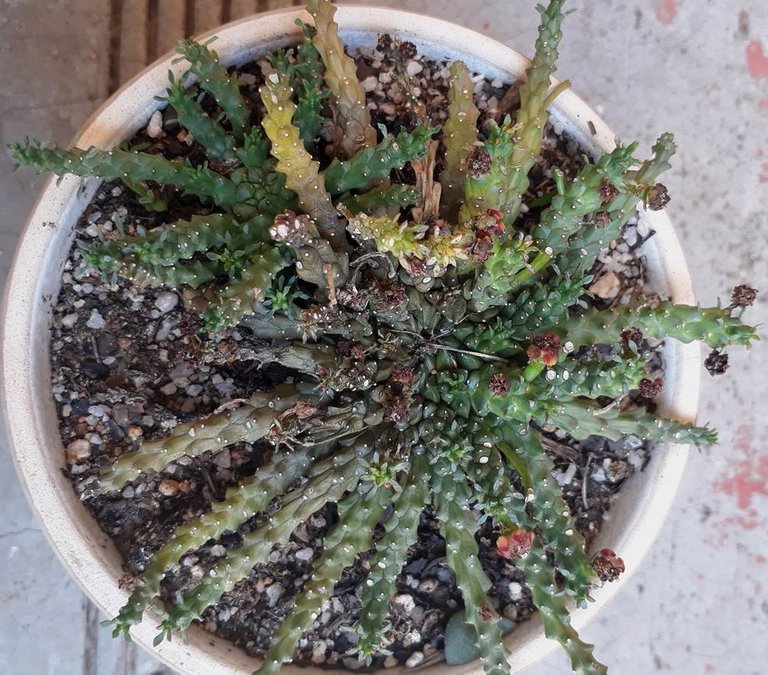
My Euphorbia gorgonis has grown happily for a couple of years so I was very disappointed when I saw it turning black. I rushed to save the second, unaffected head.
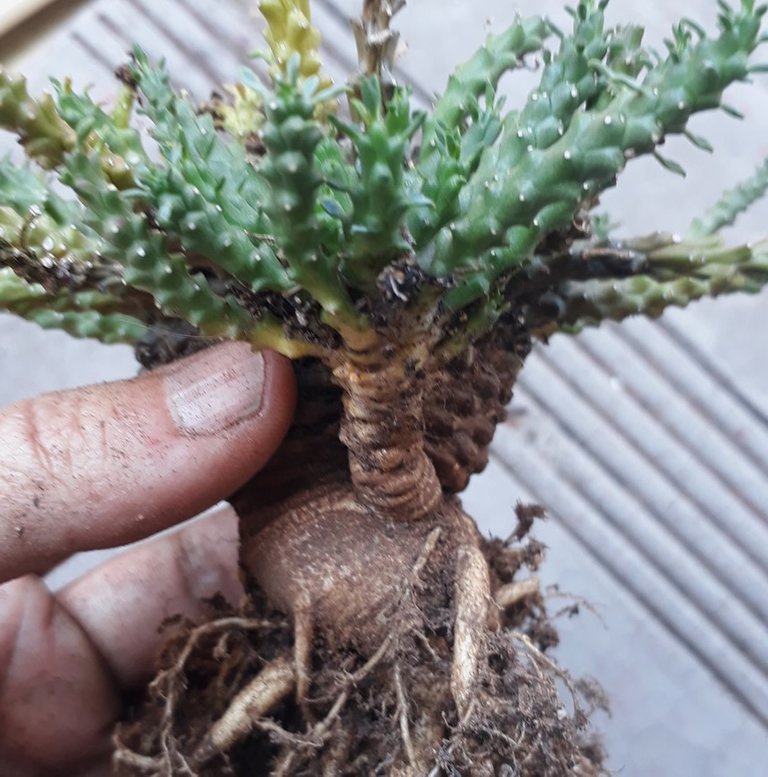
Surgery requires a sharp, sterilised knife to remove the offset and an antifungal. I used cinnamon but many people use flowers of sulphur on the cut.
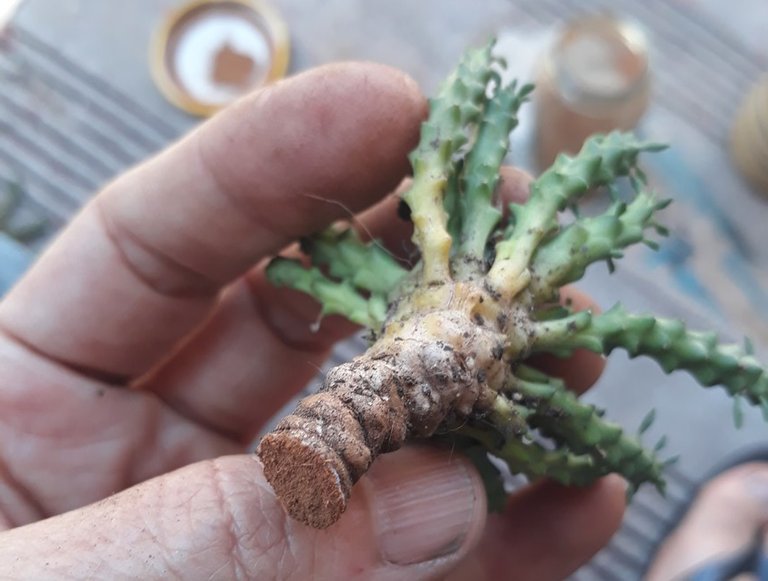
This little head has been kept in a dry shady place so the cut can heal, thereafter it will go into soil and be watered occasionally and left to form roots. I was lucky the gorgonis had two heads, the clavariodes also went rotten but it couldn't be saved, medusoids can't be propagated from arms, only by dividing the heads.
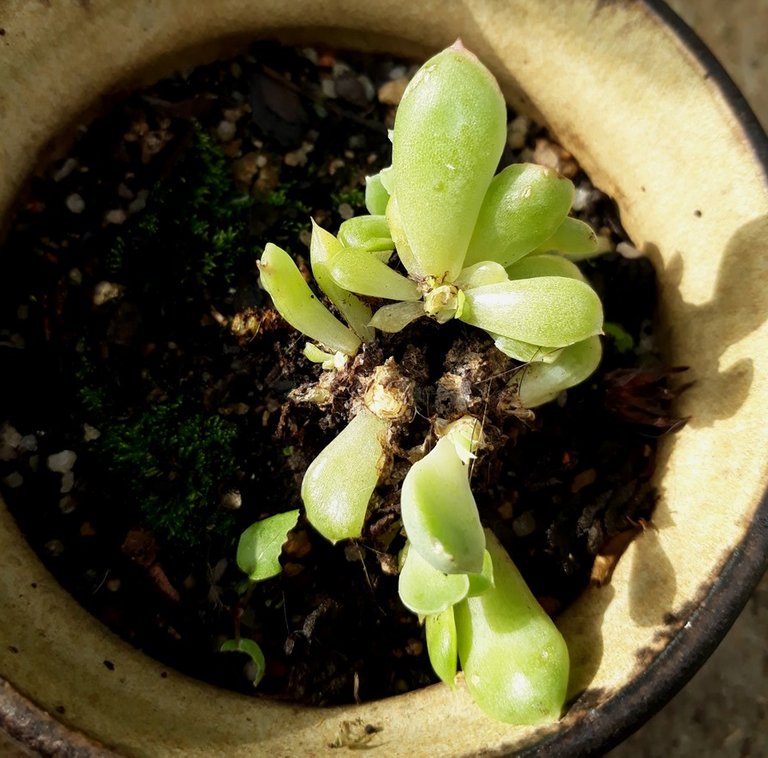
Another problem with the rains is the large numbers of snails and they are extremely damaging to succulents. The little shits had to eat my crested echeveria of course so daily hunting is now in order.
Then there are the moth and butterfly caterpillars that do their work. I don't usually kill those though, just toss them over the wall to go and eat somewhere else. The damage they do isn't the end of the world, they don't have snail-sized appetites.
That's a small update on some of the summer things, I'll do updates on the seeds as they progress, I also have Pterodiscus and Dioscoreae seeds to sow
Well done. I hope that second head survives and does well under your care!
If you really need to kill off those slugs and snails, you could consider a beer trap... I've done it... it works.
Though some yeast will also work.
I've heard of beer traps but I am scared of exterminating the tiny indigenous snails doing that. I will get myself some parktown prawns, they are great snail predators
Indeed. The beertrap will lure them all in.
I did not know you could keep those Parktown Prawns in one place. lol
The prawns will hang out wherever there are suitable living quarters and plenty of food. This means they need a compost heap nearby
Haha, cool.
Thank you for sharing this post on HIVE!
Your content got selected by our fellow curator desro & you just received a little thank you upvote from us for your great work! Your post will be featured in one of our recurring compilations which are aiming to offer you a stage to widen your audience within the DIY scene of Hive. Stay creative & HIVE ON!
Please vote for our hive witness <3
Thank you!
Oooooh thank you for this post actually. I always thought rot was from too much water, and was confused when a plant I had successfully grown with the same amount of water suddenly rotted. So I should water succulents less in the heat? I never knew!
!BEER
Yes, that's important to know about succulents. Rather move them to a cooler spot when it is hot
View or trade
BEER.Hey @nikv, here is a little bit of
BEERfrom @phoenixwren for you. Enjoy it!We love your support by voting @detlev.witness on HIVE .
Great post. I learned much. In my part of the world, we have to grow our succulents inside so its easier to control the temperatures and water. I'm always impressed when gardeners have the knowledge to rescue plants. Good luck with the seedlings. We expect updates 🙂
You will get them lol
Thanks @ackhoo and @qurator!
I wish you success in growing and saving plants!
Thank you! Summer is very frustrating here
And I thought that you no time to be bored 😊
😁
❤️
@monster-one these are my winnings and losses!
Thank you for tagging me.
I sincerely believe that nature is wise, so I agree with the way you sow your seeds, for next April I will sow more seeds like you, but it will be because I will have them protected in the greenhouse, here it is very windy and hot, so I prefer to sow in covered containers and I avoid having to be spraying water often.
In my case I have left the pots outside in the summer rain and I did not have many losses only about two or three plants, of course there are signs of having been in the rain so long but it gives them a more natural look to my cacti.
Regarding the snails, I have never had a problem with them in my garden, but I know they hate construction lime, maybe you could spray your plants with some lime powder, or make a sulfocalcic broth, about the worms yes I have had a little problem but I definitely almost don't like to spray the garden because in spite of everything, the pictures of butterflies on my plants come out great and I like them very much, so I better look in the garden and remove the worms by hand.
About cuts and fungus, I have sealed wounds using this product directly on the place of the problem, it is elemental sulfur and copper oxychloride, maybe the final result does not look aesthetic but it definitely saves the plant.
I am not satisfied with the result I had when sowing lithops but I will definitely sow seeds again and I am already looking for Frithia seeds too, oh and I also want to try Blossfelia liliputana, do you have any experience with it?
Nope, not Blossfeldia liliputana, I know more about my native succulents than cacti. I think you will enjoy grafting it if I look online.
If you get Frithia, remember that it is a summer rainfall mesemb and likes acidic soils
Good tip about Frithia, I had forgotten it.
Excelente post ✔️💯. Gracias por compartir tu experiencia, y conocimientos, aprendiendo ando 📝😎. Eres afortunado como bien dices, lograste salvar una parte de tu planta 💪🏻😎💚. Éxitos! que prosperen todas.
Gracias!
Dear @nikv,
May we ask you to review and support the our proposal renewal so our team can continue its work?
You can support the new proposal (#248) on Peakd, Ecency, Hive.blog or using HiveSigner.
https://peakd.com/me/proposals/248
Thank you!
Slugs and snails are a huge problem when it rains. Even on the second floor where I keep my plants slugs and snails get into the pots and eat my plants up.
Caterpillars are a huge problem for me, especially the caterpillars of the red pierrot which bury themselves into the leaves and eat up the plant itself in no time.
Glad you've been able to save your Euphorbia gorgonis.
Well, that was just the cutting I made, I'll have to see how it roots now
Ho Ho Ho! @nikv, one of your Hive friends wishes you a Merry Christmas and asked us to give you a new badge!
The HiveBuzz team wish you a Merry Christmas!
May you have good health, abundance and everlasting joy in your life.
To find out who wanted you to receive this special gift, click here!
You can view your badges on your board and compare yourself to others in the Ranking
Check out our last posts:
Nice post and thanks for the suggestions, I also have some succulents, I have a kind of cactus that I will write a very nice post that has grown a lot. I didn't know I could or should cut the roots like this and be able to keep it in a dry place to save it, if I understand correctly, last year maybe I saved my aloe like this, would it have worked in your opinion?
Yes, the method works for most succulents
Thanks, I try it. Marry Christmas!
Best wishes for a joyous Christmas filled with love, happiness and prosperity! 🙏
Thank you for all the love and support you constantly showed me, this past year. I'm so glad to have a friend like you in my life. Happy New Year to you.
Did the cuts eventually healed?
Hope you’re very well and all the kitties are healthy and strong!
Lots are going on around the world. Trying to stay mindful and be prepared for future uncertainty.
Take care.
I am so impressed by your dedication and knowledge when it comes to growing succulents. It's amazing to see the seeds you sowed last year sprouting so well, even without the traditional methods of covering and fungicide spraying. Your approach of misting them daily and leaving them exposed to air and ventilation seems to be working perfectly! I also admire your commitment to using soil from the mountain, which has the correct pH balance for their growth.
It's unfortunate that the weather conditions have been difficult for the past few years, but you've clearly been very careful and diligent in protecting your plants from rot. Your knowledge and experience with surgical methods to save plants like the Euphorbia gorgonis is also commendable.
I can tell that you truly care about your plants, and it's heartwarming to see how you choose to deal with caterpillars and snails. Your love for nature is inspiring, and I can't wait to see how your Pterodiscus and Dioscoreae seeds turn out. Keep up the fantastic work!
How are your cats?! Haven’t seen them for ages!
Please make some new short posts to keep us informed about things. Read a bit about South Africa, things didn’t sound so healthy!
Take care.